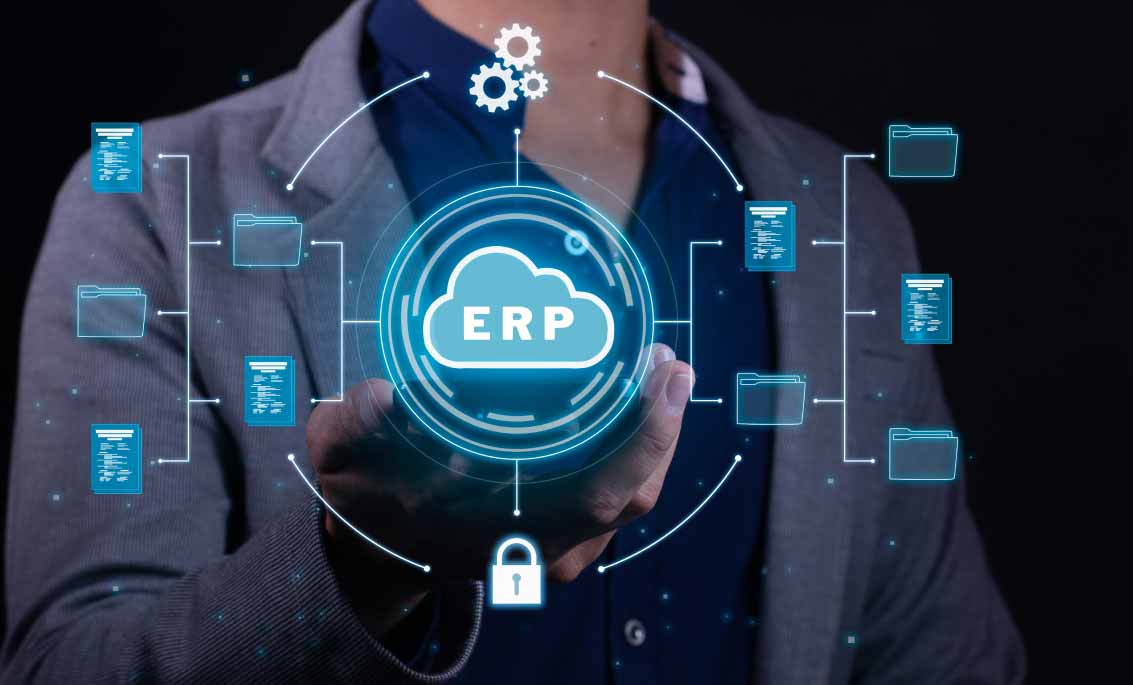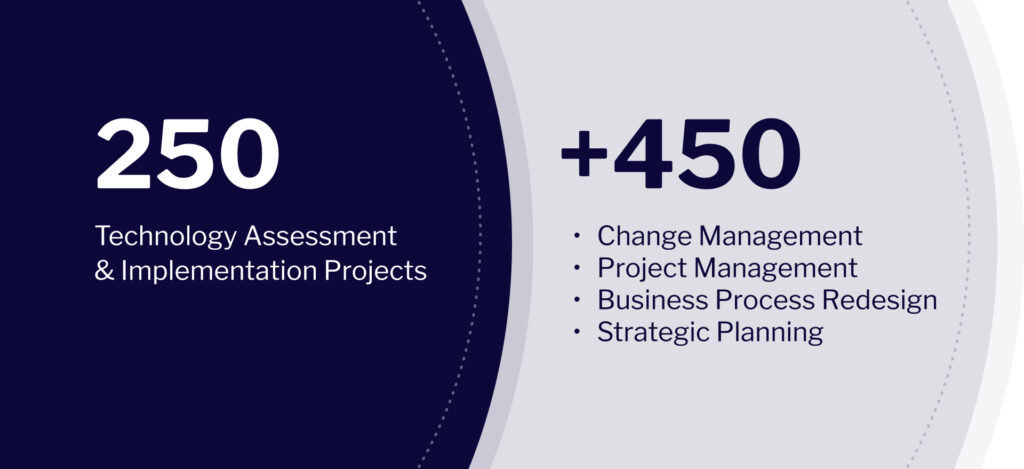Navigating the Future of ERP Software Implementation with Consulting 2.0

Digital advances in cloud-based solutions, a growing focus on developing data-informed processes and making data-driven decisions, and AI’s potential impact on it all are front-and-center issues for Enterprise Resource Planning (ERP) initiatives. Add to that the pressures of operating in a cost-constrained macro environment, and it’s no surprise that ERP-focused work is a central focus for Catalant’s client base. As businesses focus on profitability and have tighter scrutiny over big consulting spend, Catalant has seen a surge of clients looking for ERP implementation work by experienced, trained independent consultants.
An ERP, the digital nervous system of modern business operations, offers a suite of integrated applications to manage processes and streamline data across an organization. Often thought about as a business’ “single source of truth,” these central databases record data and transactions and store the information either on premises, in a company’s own data center, or, commonly sought after these days, in the cloud, on computers maintained by vendors or partners and delivered to users over the internet.
Broadly, investment in ERP is growing. Research firm HG Insights reports that the global ERP market has grown by 8% since 2022, and 1.4 million companies are expected to spend $183 billion on ERP software in 2024. Google searches for the term “ERP system” have peaked at their highest interest levels of the last five years.
Why the growing interest in ERP and enterprise software work?
In part, as companies mature and get more complex, they require more sophisticated ways to collect, process, and utilize data. Organizations must invest in digital transformations as the demand for technology and tech-enabled business processes continues to grow, while being mindful of composability and functionality across the organization. One of the reasons for the spike in this work today is the need to centralize tech stacks to enable multiple teams to operate cross-functionally. This includes not only ERP work, but CDP (customer data platform) work.
Another big driver of this work today is a result of the recent AI boom. As Final Approach Consulting LLC, a Catalant Expert firm focused on data and analytics, explains:
One reason for the push now is because of the prevalence of AI and desire to integrate AI into business processes or leverage AI commercially. Having a centralized system that can be deployed cross-functionally is the jumping off point to enable successful AI applications. AI relies on data, so if the base data layer is centralized and standardized, it makes unlocking the power of AI that much easier.”
For initiatives like these, technology, planning, and change management are critical focus areas. Having a well-developed strategy, end-to-end plan, implementation roadmap, and roll-out strategy are crucial for success. To minimize business disruption and ensure maximum adoption, working with outside experts can mitigate the risks of poor planning or poorly executed/lack of change management in these complex initiatives.
Consulting 2.0, characterized by flexible, right-sized solutions, comes as an optimal solution for handling complex enterprise software initiatives, particularly valuable to add surge capacity or to aid in client-side readiness alongside an implementation vendor partner. As a result, the organization gains the agility to navigate complex, matrixed initiatives, and move quickly to fill a need.
How does it shake out for Catalant clients?
Among Catalant’s clients (Fortune 500 enterprises, leading private equity firms, and large consulting firms), ERP software projects are highly prioritized initiatives that require dedicated resources to support.
While the configuration and implementation of a particular software, whether as a net-new technology solution or upgrade of an existing system, is the core of ERP work, we also see clients invest in critical client-side readiness activities. From vendor selection, strategy, and planning, to change management and business process redesign, these activities surround the core ERP implementation work.
Over the last 15 months, we’ve seen 250 core technology assessment and implementation projects posted on the Catalant marketplace. On top of that, 450 additional projects requiring related skill sets such as change management, project management, business process redesign, and strategic planning.

Trending ERP work on the Catalant platform
This ecosystem of ERP work on the Catalant platform typically involves:
- Vendor assessment and selection
- Upgrading to latest version of existing solution
- Strategy and planning for enterprise software transformation or implementation
- Project management around enterprise software implementation
- Change management to improve adoption of new tools and processes
- Post-merger and post-acquisition software, systems, and process integrations
Catalant Experts have hands-on experience with enterprise software vendors like SAP, Oracle, Netsuite, ServiceNow, Microsoft, Workday, and more – over 1,000 Experts have specific expertise with these tools. Many Experts are coming from firms like Accenture, Deloitte, and PwC and worked on enterprise software implementations with complex global organizations. In addition, many Experts were client-side, in strategy, project management, change management, or technical roles as leaders and key stakeholders in ERP implementations.
Here are a few recent Catalant examples.
Increased Adoption of Cloud-Based Solutions
Businesses are increasingly moving towards cloud-based ERP solutions for their scalability, flexibility, and cost-efficiency. A lot of current buzz is around SAP S/4HANA migration or upgrades, and more broadly, transition from on-prem to cloud or hybrid solutions. It’s not so simple to make a change from on-prem to hybrid or cloud, and beyond the technical requirements, training and change management are a central focus, even when the transition is to a more “user friendly” application.
The Need: A global CPG company needed an SAP expert for an S/4HANA transformation to develop, build, and execute the deployment strategy for reporting and analytics for a specific product workstream, and, more broadly, for the commercial organization. While the organization had a well-established reporting and analytics process across the commercial team, change management and digital transformation was needed across the organization to drive adoption and greater organizational agility.
The Expert: The client brought in a multi-winning Catalant Expert for approximately 9 months with end-to-end data, analytics, and strategic advisory expertise. He observed that the team was under-resourced and would not meet the desired go-live date as structured, so he developed an appropriate resourcing plan and brought in the missing capabilities. He developed the strategic roadmap to build and execute the new reporting protocols, developed training for reporting, and led reporting-focused change management activities across multiple departments. As a result, the organization was able to build a successful MVP and meet the desired go-live timeline.
Integrating Processes and Systems in Post-Merger Integration
When it comes to mergers and acquisitions, successful business integration is a priority. An acquired company may need to adopt the systems of its acquirer, or the entire entity might elect to adopt new enterprise software and processes. In all cases, careful execution of the first 100’ish days post-close are important to achieving successful outcomes. Post-merger integration is a prime opportunity for an experienced independent consultant to come in and support the integration.
The Need: A PE-backed consumer intelligence platform had just closed on the largest acquisition it had made to date and doubled its revenue. As a result, it needed a thought partner to work alongside the CEO and Head of Strategy to quarterback the integration. It had a robust integration playbook to follow, but needed help to validate the plan in place and help prioritize what needed to get done first.
The Expert: A post-merger integration specialist with over 20 years of management experience was chosen to lead the process. He worked hands-on with each workstream lead across Sales, Marketing, Operations, IT, HR, and Finance & Accounting, focusing on the first 120 days post-close. He developed the integration plans for each workstream, provided strategic direction and tactical support, including identifying cost and revenue synergy opportunities, migrating to a new NetSuiteERP instance, transforming operations to leverage automation and data science, and developing new innovations for customer cross-sell and upsell opportunities.
How a Consulting 2.0 approach is applied to enterprise software transformation
With flexibility and fit-for-purpose resourcing as the backbone of Consulting 2.0, independent consultants are invaluable in navigating the complexities of ERP software implementation, especially for transitions to SAP S/4HANA and cloud environments where nuanced expertise is needed for different scenarios and stages. Large, traditional consulting firms can burden clients with more resources than needed, and often lack the right expertise when staffing teams with junior resources who have never worked on ERP implementations, and typically have never been in an operating role where they must utilize ERP software or understand the role ERPs play, including how business functions and teams interact with the ERP.
From strategy planning and roadmapping, to customizations to fit specific business needs and integrations with existing systems, to training, change management, and continuous optimization, it’s invaluable to have the dedicated expertise of business professionals who understand the nuances of complex enterprise software implementations from an operator’s viewpoint and as consultants.